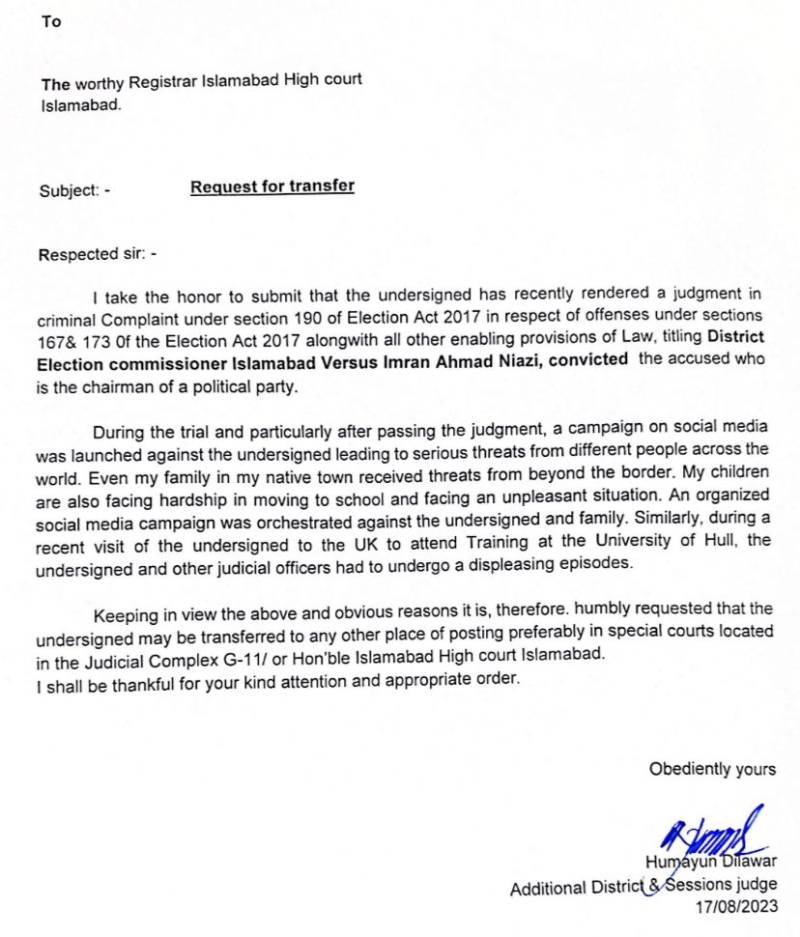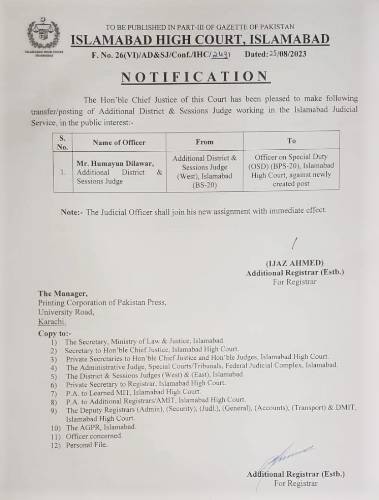
Conflicting news reports emerged on Friday evening that Additional District and Sessions Judge Humayun Dilawar, who had sentenced former prime minister and Pakistan Tehreek-e-Insaf (PTI) Chairman Imran Khan to three years in jail in the Toshakhana Case, had been transferred from the civil court.
A fact-check by The Friday Times found that while the reports were true, there was important context missing.
What happened?
On Friday evening, reports emerged on television channels that Judge Dilawar, who adjudged that Imran had misdeclared his assets before the Election Commission of Pakistan for failing to disclose income from selling gifts retained from the Toshakhana, had been reassigned as Officer on Special Duty (OSD). This post within each department carries no real designation or tasks. It effectively means the officer such designated has been suspended from duty.
However, some journalists later claimed, citing sources, that Judge Dilawar had written to the Islamabad High Court Registrar citing security threats.
The letter later emerged on the media that confirmed this to be the case.
What does Judge Dilawar's letter say?
In his letter, Judge Dilawar sought a transfer.
He refers to his judgement against Imran Khan in the Toshakhana case, adding that a campaign was launched against him during the trial, which gained steam after he issued a verdict.
"During the trial and particularly after passing the judgement, a campaign on social media was launched against the undersigned, leading to serious threats from different people across the world," he wrote, adding, "Even my family in my native town received threats from beyond the border."
Dilating on the threats and their impact on his family, Judge Dilawar noted that his children were facing hardship in moving to school and facing an unpleasant situation.
"An organized social media campaign was orchestrated against the undersigned and family," he wrote.
Judge Dilawar, who embarked on an official trip to the UK immediately after issuing the verdict in the Toshakhana case to attend a workshop on law and jurisprudence at the University of Hull in the UK on the nomination of the superior courts in Pakistan, was subjected to protests by overseas Pakistanis residing in the UK. Several protesters staged a demonstration on the campus where Judge Dilawar was attending the workshop along with other judges.
Judge Dilawar mentioned this in his letter to the IHC registrar: "During a recent visit of the undersigned to the UK to attend training at the University of Hull, the undersigned and other judicial officers had to undergo displeasing episodes," he noted.
He goes on to request a transfer from the civil courts to "preferably in special courts located in the Judicial Complex G-11 or Honourable Islamabad High Court," the letter concludes.

Was his request accepted?
The news reports that Judge Dilawar had been transferred out of the civil courts and made 'OSD' were true.
A notification was issued by the IHC Additional (Establishment) Registrar Ijaz Ahmed late on Friday said that Additional District and Sessions Judge Dilawar - a basic pay scale (BPS) grade 20 officer - had been transferred from his current posting in the civil courts of Islamabad West to Officer on Special Duty (OSD) in the IHC.
It added that the judicial officer, Judge Dilawar, "shall join his new assignment with immediate effect".
Usually this means a suspension. However, in this case, Judge Dilawar was transferred against a "newly created post" in the IHC, meaning he has been transferred and is likely to receive a new assignment in the coming days.

Wrong decision?
Earlier on Friday, Islamabad High Court Chief Justice Aamer Farooq, while hearing pleas from PTI representatives against the trial court's verdict, noted flaws in Judge Dilawar's judgement and seemed to question how the case was conducted and the verdict arrived at.

